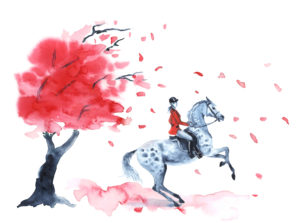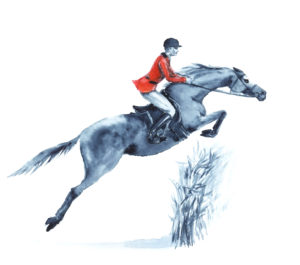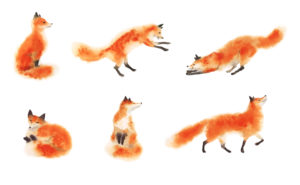With thanks to Norman Fine “Foxhunting Life” with additions from Keswick Life
Watercolors by Larisa Zorina
 This year 2016/17 being the 120th season of the Keswick Hunt Club, we often need to refresh the traditions and etiquette of this age old sport. Foxhunting is meant to be a fun sport, after all most foxhunters have risen early, cleaned a horse, tack, clothes etc. shipped to the meet and then are expecting a fun morning in the sport.
This year 2016/17 being the 120th season of the Keswick Hunt Club, we often need to refresh the traditions and etiquette of this age old sport. Foxhunting is meant to be a fun sport, after all most foxhunters have risen early, cleaned a horse, tack, clothes etc. shipped to the meet and then are expecting a fun morning in the sport.
Foxhunting has been a countryside tradition for many years. Hunting on horseback began in the Middle Ages; however, during the 16th Century the British developed foxhunting into the aristocratic sport that it is today. All civilized societies adopt rules of etiquette and conventions that allow individuals to interact without conflict. By the same token, unique activities, and especially those involving a measure of risk (motor driving, sailing, foxhunting), develop of necessity their own unique rules and conventions to help assure a safe and pleasant outcome at the end of the day for all participants.
Thus, the courtesies and conventions of the hunting field, developed over the centuries, aim to produce an environment in which an exuberant sport may flourish pleasurably and safely. As each new season begins, it is never inappropriate to remind ourselves of the courtesies at the beginning of the meet, all from the master, hunt staff and field should greet each other with a pleasant “Good Morning” starting the day to the “Moving Off” sound of the huntsman’s horn, awaiting a fun day of sport.
Landowners
If there is one single overarching concept to understand about foxhunting, it is that we are guests on someone’s land and enjoy our sport solely through his/her goodwill. Without the landowner’s hospitality, there is no hunting. The question is: How do we maintain that goodwill? We answer that question every hunting day in the way we treat our landowners’ land, crops, and livestock.
• In general, commit no act that might test the landowner’s goodwill.
• Greet the landowner cheerfully and respectfully if you should see him/her.
• Arrive at the meet early enough to get tacked up and mounted before hounds move off. The Master does not want latecomers straggling over the landowner’s country, and the huntsman does not want latecomers heading the fox if it has circled back. If you are unavoidably late, stay to the roads after mounting up and wait for the best opportunity to join the field.
• All gates should be left as you find them. Closing a gate that was open might deprive livestock of their access to water. Leaving a gate open that was closed may allow livestock to escape or mix improperly with other stock. When in doubt, close the gate and tell the Field Master what you have done.
• If the field is passing through a gate, listen for the command as to what to do with the gate. If it is to be closed, you will hear, “Gate please.” If it is to remain open, you may hear no command at all, but you may hear, “Gate open.” In either case it is important that you acknowledge with a signal that you have heard the command. Likewise, if you are giving the command to those behind you, be certain your command is acknowledged. That is the only way to be certain the command was heard.
• If a gate is to be closed, it is the responsibility of the last one through to close it. It is common courtesy for one or two riders near the back to remain behind to help if necessary and to keep the gate-closer’s horse company.
• Never leave a gate for the second field or the hilltopping field to deal with unless they are close enough to acknowledge their understanding of what must be done.
• If a fence is damaged and cannot be repaired on the spot, advise the Field Master immediately so he or she can make appropriate and timely arrangements for its repair.
• Stay to the edge of all crop fields and seeded fields. If field members are crossing a pasture, it is best to spread out rather than erode a single track across the field.
• Slow down if livestock are running. Walk past dairy cattle. Walk past livestock during the calving, foaling, or lambing season. Do not ride between livestock and their offspring.
• Do not jump fences unnecessarily. You might break one and needlessly create a situation you have to resolve.
• Keep up with the field. If you are having difficulty keeping up, ask to be excused and fall back to the second field or the hilltopping field. Neither Master nor huntsman wants to see riders or small groups strung out across the country. The Master is concerned about the landowner, and the huntsman is concerned that if the fox doubles back it might be headed and the hunt spoiled.
• Unless you have specific personal permission, do not hack across private property on your own. Permission granted to the hunt does not bestow similar privileges on individual hunt members.
• Do not litter. Carry used food wrappers back home in your pocket.
• If you choose to leave the meet early, ask the Field Master if you may be excused and ask his advice regarding your route back to the meet. In general, you should hack back on the roads so as not to disturb any covert yet to be drawn.
• Do not sweep manure from your trailer at the meet. The landowner does not need your mess, nor should he have to worry about your horse’s de-worming regimen.
Master and Staff
 It is a Master’s responsibility to set the example and enforce hunt standards to make a day of foxhunting enjoyable for the field. The ideal Master of Hounds possesses many exceptional qualities; a love for hounds, horses, nature, wild animals and conservation; a consuming passion for foxhunting’s lifestyle; a dedication to organizing the best hunt and best sport possible; a willingness to sacrifice much personal time for the good of the hunt, realizing that the reward will be the privilege of being a Master of Foxhounds; and a willingness to live by a time-honored code of ethics that identifies you as a gentleman or lady and establishes that your word is your bond.
It is a Master’s responsibility to set the example and enforce hunt standards to make a day of foxhunting enjoyable for the field. The ideal Master of Hounds possesses many exceptional qualities; a love for hounds, horses, nature, wild animals and conservation; a consuming passion for foxhunting’s lifestyle; a dedication to organizing the best hunt and best sport possible; a willingness to sacrifice much personal time for the good of the hunt, realizing that the reward will be the privilege of being a Master of Foxhounds; and a willingness to live by a time-honored code of ethics that identifies you as a gentleman or lady and establishes that your word is your bond.
In the early days of foxhunting, most Masters were born into the sport. Most hunts were private packs and the Masters had the means, owned the land and managed their own hounds and hunt. They invited friends and neighbors to hunt with them, and often the children of these Masters took over as age or circumstance dictated, keeping hunts within families. With few exceptions, those days are long gone.
While now there are a few Masters who are wealthy and a few who make it on a shoestring, today the average Master is middle income. Most Masters are either elected or appointed to office, depending on whether the hunt is a subscription or membership pack. Private hunts are the rare exception. It is estimated the average Master’s term of service is eight (8) years, so Masters come and go fairly frequently, often with little direct experience to prepare them for mastership.
Short masterships are detrimental to hunts in many ways. One needs time to learn and develop knowledge of and friendship with landowners, to make competent and well considered breeding decisions, to earn respect from hunt staff, members or subscribers and develop wisdom about all aspects involved in maintaining a first class pack of hounds. These necessary talents are hard to develop with short-term masterships. Masters who were brought up by a father or mother and lived in the hunting life, who hunted as children and were tutored by parents who were Masters are extremely rare.
At least one Master should always be present on hunting days. Good organization is the key to good sport. It stems first and foremost from good relationships with your landowners whose land you may access. It is also vital to have the good will of lessees of the land you hunt. The Master organizing the day’s hunting should do the following: contact landowners and lessees whose land is likely to be used that day to seek permission for that particular day’s hunting. Ensure the Master and huntsman recognize farmers by name and show courtesy to landowners or farmers that you encounter on the day. Whenever possible get off your horse when meeting them and take off your hat. Instruct your field to smile, wave and get out of the way of anyone they come across. The best time for the Master to visit all landowners is prior to Autumn hunting.
The Huntsman controls the hounds, indicating to them by signals where he wishes them to draw for a fox, and he is responsible for a fox being well hunted when found. His technical decisions must be quickly made, and staff and Field must abide by them or utter chaos will ensue. As the Huntsman is quite often a professional he originally was described as a Hunt Servant and in the modern world of Foxhunting, the Huntsman should also realize he must be respectable, smart and clean in appearance, civil and well-mannered. The character of the hunt may be fairly judged by the manners and turn-out of the servants.
The Whippers In assist the Huntsman in controlling hounds by turning them back to the Huntsman or by encouraging them forward to him as necessary. Also, they are used by the Huntsman as scouts to get notice of the movement of a fox. No one except the Huntsman gives orders to Whippers-In. No one except by request of the Huntsman or MFH should accompany them or attempt to assist them.
The Field
• Greet the Master politely upon arriving at the meet. Thank him and thank the staff at the end of the day. When departing, it is correct to say, “Goodnight,” even if it’s still morning!
• Don’t talk to the huntsman during the hunt. His attention is and should be elsewhere.
• Never come between the huntsman and his hounds.
• Don’t crowd the huntsman or his hounds.
• Don’t pass the Field Master. Follow, but don’t press. He is constantly revising his planned route based on how hounds are running, what the huntsman is doing, and how the terrain is unfolding.
• Be quiet when the Field Master stops. He is listening for hounds.
• The whippers-in and the huntsman have the right of way. Always defer to them and allow them room to pass. When standing, always point your horse’s head toward them as they pass.
• Never talk to a whipper-in during the hunt. His huntsman demands that he keeps his full attention on the hounds and the quarry. Any distraction at the wrong moment that causes him to miss something he should have seen can irretrievably ruin a hunt.
Hounds and Quarry
 • Hounds always have the right of way.
• Hounds always have the right of way.
• The worst crime one can commit in the hunting field is to allow one’s horse to kick a hound. You must do everything in your power to train your horse against this vice or punish your horse immediately if he commits such a crime.
• Never ride ahead of hounds or ahead of the quarry. Never get between hounds and the quarry.
• When hounds are drawing for a fox or casting after a check, remain still and quiet so as not to distract them.
• In general, never speak to a hound. That is the job of the huntsman and whippers-in.
• If hounds come near to you, turn your horse’s head toward them.
• If you view a fox, never startle it with a holloa. Its scent will change, and hounds will be confused. Wait quietly until it is some distance from you, then tell the Field Master what you have seen. Let the Field Master make the decision whether or not to holloa. If hounds are hunting well, the huntsman will not want to lift them and will not want them distracted.
• Do not bring an unprepared horse into the hunting field. Of greater concern than the danger to yourself is the danger you pose to other innocents.
• If your horse is fractious or out of control, remove him from the hunt field immediately. Don’t bring him back until you have solved his problems.
• If your horse kicks out at other horses occasionally, braid a red ribbon into his tail and keep him in the back of the field. If he cannot be cured of the vice, find another job for him away from the hunting field.
• If someone is riding too close behind, and you are afraid your horse may resent it, place one arm behind your back, forearm horizontal at the waist, palm out. This is a universal warning that your horse might kick. Likewise, if you see the rider in front give you such a signal, fall back.
• Do not allow your horse to nuzzle, nip, or rub the rump of the horse in front of you. Even a non-kicker can be provoked to kick.
• Do not coffee-house and chatter while hounds are hunting, even if you are far removed from the pack. Other field members are trying to watch and listen.
• When warning other riders of holes or other hazards (i.e., ’Ware hole, ’Ware wire, etc.), turn and speak loudly enough to be heard only by the riders immediately behind you. Do not shout the warning so as to distract hounds. Point to the hazard with your whip, crop, or finger. If the warning has been repeated several times before you arrive at the hazard, and you think the people behind you are already alerted, it may only be necessary for you to point at it.
• When queued at a jump, be certain the rider in front of you is safely over before you jump.
• If your horse refuses a jump, go to the back and allow the other field members to jump ahead of you and go on. Everyone wants to keep up with hounds, and it is rude to prevent them from doing so if your horse is being obstinate.
• Before bringing a guest to your field, seek permission from your Master. If you bring a guest, introduce him to the Master as soon as possible. Your guest is your responsibility. Acquaint him with any local protocol and stay nearby to assist him.


